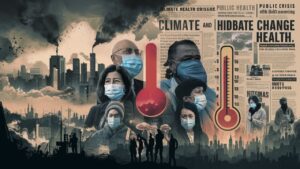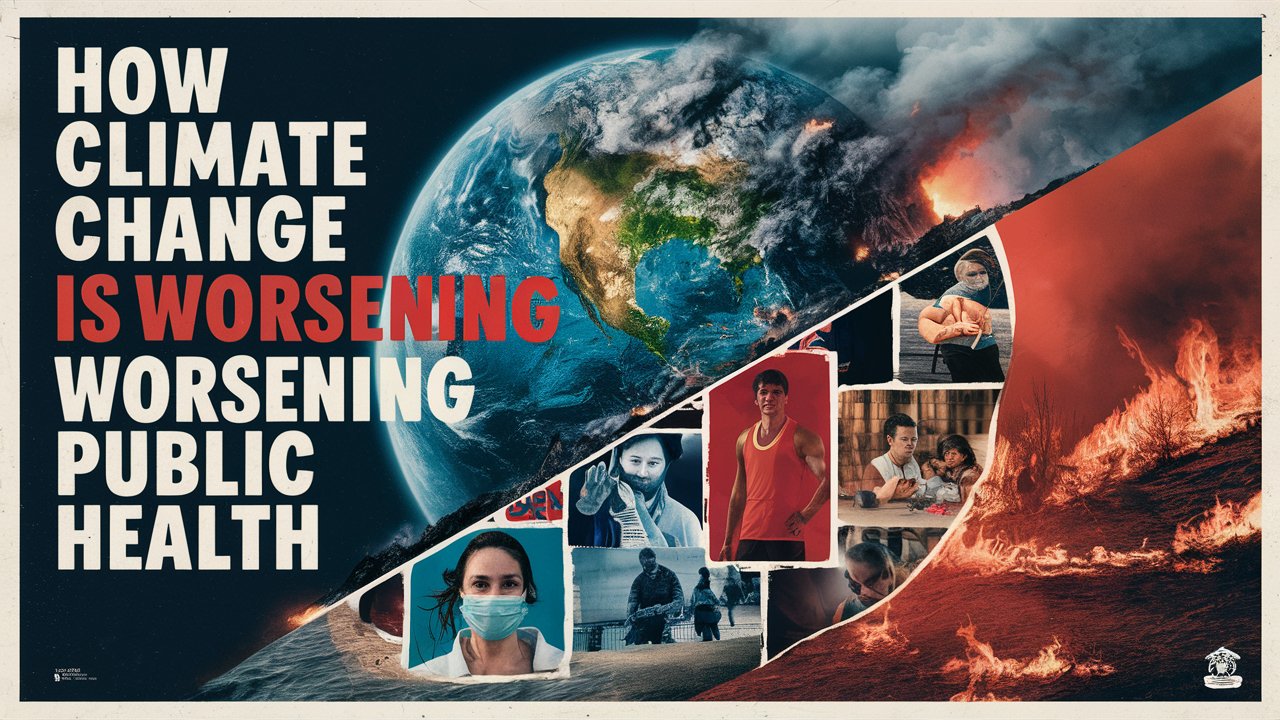Climate change and public health are two critical issues that are deeply intertwined. While climate change is a global environmental crisis, it also significantly impacts public health, creating a paradox where efforts to address one issue can sometimes exacerbate the other. Understanding this complex relationship is crucial for developing effective strategies to protect both our planet and our health.
The Relationship Between Climate Change and Public Health
Defining Climate Change
Climate change refers to long-term shifts in temperatures and weather patterns, primarily due to human activities such as burning fossil fuels, deforestation, and industrial processes. These changes can lead to extreme weather events, rising sea levels, and altered ecosystems.
Overview of Public Health
Public health is the science of protecting and improving the health of communities through education, policy-making, and research for disease and injury prevention. It encompasses a wide range of issues from infectious diseases to chronic illnesses and environmental health.
How Climate Change Affects Public Health

Rising Temperatures and Heat-Related Illnesses
As global temperatures rise, heatwaves become more frequent and intense, leading to an increase in heat-related illnesses and deaths. Vulnerable populations, such as the elderly, children, and those with preexisting health conditions, are at higher risk.
Impact on Air Quality
Climate change can worsen air quality by increasing the concentration of ground-level ozone and particulate matter. Poor air quality is linked to respiratory conditions like asthma and chronic obstructive pulmonary disease (COPD), as well as cardiovascular diseases.
Waterborne Diseases
Warmer temperatures and changing precipitation patterns can impact water quality, leading to an increase in waterborne diseases. Contaminated water sources can harbor pathogens that cause illnesses such as cholera, giardiasis, and cryptosporidiosis.
Extreme Weather Events
Increased Frequency of Hurricanes and Floods
Climate change contributes to more frequent and severe hurricanes, floods, and storms. These events can cause immediate injuries and fatalities, as well as long-term health issues due to displacement, contamination of water supplies, and disruption of healthcare services.
Health Impacts of Natural Disasters
Natural disasters can lead to a range of health problems, including trauma, infectious diseases, and mental health issues. The aftermath of such events often sees a surge in illnesses due to poor living conditions and lack of access to medical care.
Vector-Borne Diseases
Expansion of Habitats for Disease Vectors
Warmer temperatures and changing precipitation patterns create favorable conditions for the spread of vector-borne diseases. Mosquitoes, ticks, and other vectors thrive in warmer climates, increasing the risk of diseases such as malaria, dengue fever, and Zika virus.
Examples: Malaria, Dengue, and Zika
Regions previously unaffected by these diseases are now experiencing outbreaks, putting millions at risk. Efforts to control these diseases require substantial resources and coordination.
Food Security and Nutrition
Impact of Climate Change on Agriculture
Climate change affects crop yields and food production, leading to food insecurity and malnutrition. Extreme weather events can destroy crops, while changes in temperature and precipitation can reduce agricultural productivity.
Malnutrition and Foodborne Illnesses
Food scarcity can lead to malnutrition, particularly in vulnerable populations. Additionally, changes in food production and supply chains can increase the risk of foodborne illnesses.
Mental Health Implications
Stress and Anxiety from Climate-Related Events
The psychological impact of climate change is significant. Stress, anxiety, and depression can result from experiencing or fearing climate-related events such as natural disasters and prolonged heatwaves.
Long-Term Psychological Effects
The long-term mental health effects of climate change include chronic stress and post-traumatic stress disorder (PTSD). Addressing these issues requires comprehensive mental health support and resources.
Vulnerable Populations

Who Are the Most at Risk?
Certain groups are more vulnerable to the health impacts of climate change, including low-income communities, the elderly, children, and people with preexisting health conditions. These populations often lack the resources to cope with and recover from climate-related health issues.
Socioeconomic Factors
Socioeconomic factors play a significant role in determining vulnerability. Access to healthcare, housing quality, and education levels can influence how severely individuals are affected by climate change.
Climate Migration
Displacement Due to Environmental Changes
Climate change can force people to migrate due to rising sea levels, extreme weather events, and changing agricultural conditions. This displacement can lead to numerous health challenges, including lack of access to healthcare, poor living conditions, and increased exposure to diseases.
Health Challenges of Migrants
Migrants often face significant health risks, including malnutrition, infectious diseases, and mental health issues. Ensuring their health and well-being requires coordinated efforts and resources.
Urbanization and Health Risks
Heat Islands and Respiratory Issues
Urban areas can become “heat islands,” where temperatures are significantly higher than in surrounding areas. This can exacerbate heat-related illnesses and respiratory problems due to poor air quality.
Overcrowding and Infectious Diseases
Overcrowding in urban areas can facilitate the spread of infectious diseases. Poor sanitation and limited access to healthcare services further increase the risk of outbreaks.
Public Health Infrastructure
Strain on Healthcare Systems
The increasing frequency and severity of climate-related health issues put a strain on healthcare systems. Hospitals and clinics may become overwhelmed, and resources can become scarce during extreme weather events.
Need for Climate-Resilient Health Infrastructure
Building climate-resilient healthcare infrastructure is essential to withstand the impacts of climate change. This includes improving facilities, training healthcare workers, and developing emergency response plans.
Mitigation and Adaptation Strategies
Reducing Greenhouse Gas Emissions
Mitigating climate change requires reducing greenhouse gas emissions through clean energy, sustainable agriculture, and reforestation. These efforts can help slow the progression of climate change and its health impacts.
Enhancing Public Health Preparedness
Adaptation strategies include enhancing public health preparedness by developing early warning systems, improving disease surveillance, and increasing public awareness of climate-related health risks.
Role of Governments and Organizations
Policy-Making for Climate and Health
Governments play a crucial role in addressing climate change and public health through policy-making. Policies that promote sustainable practices, reduce emissions, and improve healthcare systems are essential.
International Cooperation
International cooperation is vital for tackling the global issue of climate change. Countries must work together to share resources, knowledge, and strategies to mitigate and adapt to climate change.
Community Involvement and Awareness
Grassroots Movements
Community involvement is crucial for addressing climate change and public health. Grassroots movements can drive local initiatives, raise awareness, and advocate for policy changes.
Importance of Education and Awareness
Education and awareness campaigns can help people understand the link between climate change and public health. Informed communities are better equipped to take action and support policies that protect their health and the environment.
Climate change poses a significant threat to public health, creating a paradox where efforts to address environmental issues can exacerbate health problems. By understanding the complex relationship between climate change and public health, we can develop integrated solutions that protect both our planet and our well-being. It is essential to take collective action at all levels, from individual behaviors to international policies, to mitigate the impacts of climate change and ensure overall wellbeing of humankind.
https://medium.com/@venusom/the-hidden-health-crisis-ee5cee4709a3
Cardio or Weightlifting: The Best Workout When Time is Limited
“Evaluating Your Need for Supplements: 5 Critical Questions”

2 thoughts on “How Climate Change is Worsening Public Health :The Hidden Health Crisis”